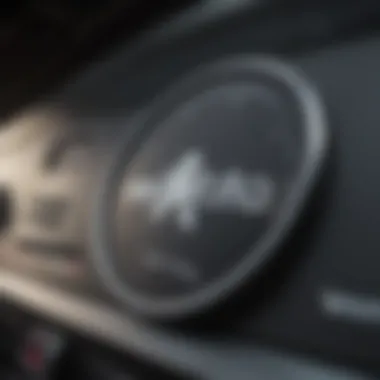How to Obtain Your Vehicle's VIN Number: A Comprehensive Guide


Intro
The Vehicle Identification Number, commonly abbreviated as VIN, acts like a fingerprint for your automobile. Whether you're in the market to buy, sell, or insure your vehicle, understanding how to acquire this unique identifier is essential. The VIN holds a wealth of information about a car, and navigating the labyrinth of obtaining it can seem daunting. This guide will help demystify the process; it offers practical insights that can lead you to the elusive number.
Understanding the VIN isn’t just about identification; it encompasses more. It's pivotal in tracking the history of a vehicle, ensuring that the wheels you're about to own or sell aren't tangled in issues like accidents or theft. In an increasingly digital world, having easy access to this information streamlines transactions and protects buyers and sellers alike.
No matter the make or model of your vehicle, or the circumstances surrounding your transaction, this guide will walk you through all steps involved in acquiring that vital VIN number. You'll be armed with knowledge, enhancing your experience in the automotive landscape, and enabling more informed decisions.
The Importance of the VIN
The VIN serves multiple significant purposes that touch all aspects of vehicle ownership. This unique code, typically consisting of 17 characters, contains crucial information about the vehicle's make, model, year of manufacture, and place of origin. The VIN can improve the safety of your investment, acting as a shield against fraud.
For example, when purchasing a used car, a quick check of the VIN reveals if the vehicle has been reported as stolen or involved in any severe accidents. It also provides a detailed maintenance history, ensuring potential buyers can make informed choices—nobody wants a lemon, right?
Even for insurance companies, the VIN is their bread and butter, used to assess risk and determine the cost of premiums. Identifying a vehicle accurately is a must in this sector, helping to keep everything on the level.
"A VIN is not just a number; it's the story of your vehicle, and knowing how to access that story can save you time, money, and heartache."
Understanding these nuances lays the groundwork for our later discussions on legal considerations, locating the VIN, and its practical use in the automotive world.
Navigating Legal Considerations
Before diving into how to find the VIN number, it’s wise to consider the legal framework surrounding its use. Laws govern almost every aspect of life with vehicles, and the VIN is no exception. Knowing the legal implications can prevent potential hiccups in registration, ownership transfer, or claims.
In many countries, using someone else's VIN number is a serious offense. This aspect is particularly critical when buying or selling used cars. It’s essential to verify the VIN against the title and registration documents to prevent any legal shenanigans down the line. A simple mismatch can cause mountains of trouble.
Beyond legality, understanding the privacy aspects is also key. With more thieves turning to high-tech means, protecting your VIN is vital. You wouldn't want it ending up in the wrong hands, after all!
Steps to Locate Your VIN
To wrap up this introductory section, let’s drill down into the actual steps to locate the VIN on different vehicles.
- Check the Dashboard: Look at the lower corner of the driver's side. The VIN is often visible from outside the car through the windshield.
- Driver’s Side Door: Open the driver’s side door and inspect the frame where the door hinges meet. You should find a label with the VIN there.
- Under the Hood: In some vehicles, the VIN may be stamped on the engine. Look for a metal plate or sticker.
- Vehicle Registration and Title: Always double-check. The VIN is listed in both the registration documents and the title.
- Insurance Documents: Your vehicle insurance paperwork should also display the VIN.
With a clearer picture of the VIN’s significance, legal context, and how to find it, the upcoming sections will guide you deeper into the various ways to secure this valuable number.
Understanding VIN: The Basics
The Vehicle Identification Number (VIN) holds significance beyond mere numbers and letters—it acts as a unique fingerprint for a vehicle. Understanding the VIN can save you from potential pitfalls and offers protection in various automotive transactions. It's crucial to familiarize yourself with what it means and the critical role it plays.
Definition of VIN
A VIN is a 17-character code made up of letters and numbers that encompasses essential information about a vehicle. It is standardized globally, making it easier to trace specific details about the car's manufacturer, brand, model, engine type, and place of production. Essentially, VINs serve as the vehicle's identity card, ensuring that every car on the road can be accounted for.
Importance of VIN in Car Transactions
The VIN ropes in various aspects of car dealings, and knowing it can keep you ahead of the game, whether you're looking to buy, insure, or evaluate a vehicle.
Purchasing a Vehicle
When buying a vehicle, knowing the VIN can reveal a treasure trove of information. This number helps potential buyers verify that the car is not stolen and has not been involved in significant accidents. One key characteristic of using the VIN in purchasing is that it enables a vehicle history report to be generated. This is not just beneficial; it's essential to ensure you're not sinking your money into a ticking time bomb. What makes this an attractive choice for many buyers is that it provides assurance and peace of mind, which is invaluable in a costly investment. Additionally, it allows for cross-checking seller claims against the vehicle's actual history.
Insurance and Registration
The VIN is also integral in obtaining insurance and registering your vehicle. Insurance companies require it to create a profile for risk assessment and vehicle evaluation. What stands out about VIN in the context of insurance is its role in premium calculations and claims processing. This makes it a noteworthy choice for vehicle owners concerned about coverage. Legally, you cannot register a vehicle without providing its VIN, thus underlining its necessity in the registration process, which, in itself, presents unique advantages.


Tracking Vehicle History
If you’ve ever wondered about a car's past, the VIN is your gateway. It allows for the tracking of everything from previous owners to any modifications made. The ability to delve into accurately recorded vehicle histories is a crucial characteristic of the VIN system. It can unearth hidden damages or warnings that may potentially affect the vehicle’s longevity. For buyers scrupulous about their investments, this feature solidifies the VIN's status as a key identifier in automotive transactions. This aspect is particularly helpful if you ever find yourself in a dispute; having a detailed history facilitates more straightforward resolutions.
"The VIN is not just a series of random numbers—it’s the key to uncovering the story behind a vehicle."
Overall, understanding the VIN lays down a foundation for making informed decisions, whether you're buying, insuring, or just curious about your vehicle's past. Its importance cannot be overstated when engaged in any automotive transactions.
Where to Locate a VIN
Knowing where to find the VIN is a fundamental piece of the puzzle when ensuring a smooth automotive transaction. The VIN, or Vehicle Identification Number, is crucial not just for identifying the car, but for tracing its history and verifying its legitimacy. Whether you're purchasing a second-hand car or just curious about your current vehicle's background, understanding where to locate the VIN can save you considerable time and potential headaches.
Common Locations on Vehicles
Most vehicles have fixed locations for their VIN, and knowing these spots can help you locate it efficiently.
Dashboard
The dashboard is often the first place to check for a VIN. Specifically, you’ll typically find it near the windshield on the driver's side. This has a key characteristic: its visibility from outside the car, allowing potential buyers or inspectors to check the number without entering the vehicle. It's usually stamped onto a metal plate, which makes it durable and less likely to fade, ensuring that the information remains legible.
A unique feature of the dashboard placement is that it is one of the easiest and most accessible spots. However, it can be obscured by sunshades or decorations, and if someone has tinted the windows, visibility may be further hampered. Always check here first, though, as it’s a consistent location across multiple vehicle makes and models.
Driver's Side Door Frame
Another common location is the driver’s side door frame, usually found where the door latches when it's closed. This area, too, offers a considerable advantage—it’s not only easy to access but also a location where the VIN is often printed on a sticker. The sticker is designed for durability against peeling, ensuring that a clear image remains applicable through years of wear and tear.
However, this location may pose some disadvantages. Depending on the vehicle's age, the sticker might peel off or fade, making it difficult to read.
Engine Block
For the mechanically inclined, the engine block is a crucial area to check for the VIN as well. It's usually stamped directly onto the block itself. This location serves a specific purpose; it’s a secure spot that ensures the number is tied to the heart of the vehicle, making tampering quite difficult. Furthermore, finding the VIN here can provide added confidence that the vehicle is authentic, particularly for classic cars where documentation might vary.
The downside is that accessing the engine block can be more involved, requiring tools or a bit of mechanical know-how to get into smaller engine compartments.
Checking Documentation
If locating the VIN directly on the vehicle proves more challenging than anticipated, various documents hold the answers.
Title and Registration Documents
An obvious yet often overlooked choice is to look at the title and registration documents. The VIN is a mandatory entry on these documents, firmly tying your identification to the vehicle. Their key characteristic is their official nature—they are legally binding, meaning any discrepancies could lead to issues during transactions or insurance claims.
This unique feature provides peace of mind; if you can match the VIN on your documents to the one on the vehicle, you can ensure ownership legitimacy. The downside? If you’ve misplaced these documents, it could delay the verification process.
Insurance Policy Information
Insurance documents will also typically list your vehicle's VIN, as they need this to process coverage accurately. This is beneficial as it provides an added layer of protection: insurers can verify the vehicle’s history and ensure that it is not a stolen car.
However, keep in mind that gaining access to this info may require you to contact your insurance provider, which could take time.
Service Records
Service records also serve as a hidden gem when searching for your VIN number. Mechanics often record the VIN during routine maintenance or repairs. This is advantageous because it helps you track your car’s service history associated with the VIN accurately.
Still, the drawback here is that these records might not be comprehensive if you’ve changed service providers or performed DIY maintenance.
Using Online Resources


Should traditional methods fall short, the internet might just be your new best friend in locating your VIN.
Manufacturer's Website
Most manufacturers have websites where you can input your vehicle's details to retrieve the VIN. This approach is beneficial because it’s direct — you’re getting the information from the source. You can also find additional information about recalls and service bulletins related to your specific vehicle.
However, it's worth mentioning that not all manufacturers have user-friendly interfaces. You might have to dig through several pages or even contact support for help.
VIN Lookup Tools
Various VIN lookup tools online can provide extensive details about a vehicle using only the VIN. These third-party services can often present comprehensive histories, including accident records or previous ownership—critical for buyers.
The caveat here is that some services can charge a fee. Plus, depending on the site's credibility, there's always a risk of inaccurate information.
The key to effectively utilizing the VIN is by knowing where to find it in both physical and digital spaces. Understanding these avenues will serve both buyers and sellers in the vehicle market.
Steps to Retrieve a VIN
Acquiring the Vehicle Identification Number (VIN) is not just a checkbox on a to-do list; it's a vital step in safeguarding your investment in a vehicle. A VIN is essentially the DNA of your car, offering insights into its make, model, year of manufacture, and even its history. Understanding how to efficiently retrieve this number can save you from headaches down the road, such as fraud or miscommunication during vehicle transactions. In this section, we’ll explore several methods to help you locate your VIN in both tangible and digital realms.
Physical Inspection
Inspecting Common Areas
When it comes to tracking down your VIN, physical inspection is like being a detective in your own garage. The most typical areas where you can find it include the dashboard, driver's side door frame, and sometimes even the engine block. Each of these locations has a certain distinctness that stands to ease your hunt.
For instance, checking the dashboard allows you to glance at a visible plate through the windshield. It's a straightforward spot that often carries the VIN right where you expect it. The driver's side door frame, however, is a less conspicuous yet equally significant spot – because there the VIN tag is permanently attached and won’t fade away.
To boot, the engine block often contains a stamped VIN, though you might require some elbow grease to get to it. Vehicles are designed different, so the exact location can alter. What’s beneficial here is that inspecting these common areas is generally accessible, requiring little more than your own scrutiny and perhaps a flashlight.
Using a Flashlight for Better Visibility
In the world of VIN hunting, a flashlight can be your best buddy. You might think, "It's just a number," but trust me, without proper lighting, it can be like looking for a needle in a haystack. Particularly in cramped spaces like under the dashboard, shadows can hide the VIN from plain sight. So, shining a light earlier can save you a world of frustration.
The key characteristic of using a flashlight is that it enhances visibility in otherwise poorly lit areas, making finding every digit possible. Notably, this technique isn't only useful outdoors; it's quite handy for older cars where dust or grime can obscure details. Just be cautious, as sometimes you can inadvertently shine a light on revealing scratches if looking too aggressively.
Document Checks
Review Ownership Records
Another important method to find your VIN is through reviewing ownership records. When you purchased your vehicle, whether it's a brand-new ride or a pre-owned gem, there should have been documents exchanged that state your VIN clearly. This could be your purchase receipt or the registration documents filed at your local DMV.
The significant characteristic of ownership records is reliability. They provide not only the VIN but also additional insights like the purchase date and previous owners. However, this approach does hinge heavily on having access to these documents. If you've misplaced them, it can lead you to a less fortunate dead end.
Contact Previous Owners
If your car was a hand-me-down from a friend or perhaps bought from a private seller, contacting previous owners can yield some unexpected joy in your quest for the VIN. People who've owned the vehicle before often keep meticulous records, and asking them directly can often help you uncover details faster than you might think.
The fundamental advantage of reaching out to previous owners is that they may have knowledge of where the VIN is located, or even have documentation saved that includes it. Plus, it’s a good opportunity to learn more about your vehicle's history, which can inspire confidence in your investment. Just bear in mind, sometimes folks can be a bit elusive, and they might not respond, leaving you back at square one.
Online VIN Retrieval
Online VIN Check Services
The digital age has provided us with tools that make finding a VIN easier from the comfort of your home. Various online VIN check services exist that can help you track down this elusive number, proving especially useful if physical inspection isn’t possible or you prefer to avoid it.


These services usually require a bit of personal information, but they can provide not only the VIN but also vehicle history reports that cover things like past accidents or title issues. One key aspect is that they grant you access to extensive databases, making them a popular choice for serious buyers or sellers. Just watch out for any subscription fees or scams in this online jungle.
Social Media and Owner Forums
Lastly, let’s not overlook the power of community. Social media and automotive forums often serve as a goldmine of information. Car enthusiasts share advice, and sometimes, others might have faced the same challenge you're up against. Posing a question on platforms like Reddit or within automotive groups on Facebook might just lead you to someone who has the knowledge you need.
This approach's key characteristic is the sharing of experiences. Online forums can provide step-by-step advice from those who have successfully retrieved a VIN in a variety of situations. However, the downside is potential misinformation. Therefore, it’s wise to validate any advice or tips you receive.
Legal and Privacy Considerations
When it comes to vehicle ownership, the Vehicle Identification Number (VIN) stands as a keystone of verification and legitimacy. Understanding the legal and privacy dimensions intertwined with VIN usage is imperative, especially for anyone looking to buy, sell, or insure their vehicle. The implications of the VIN stretch far beyond mere identification; they touch upon transactions, regulations, and personal data security.
Legal Importance of VIN
The VIN, a unique alphanumeric code, is fundamental in establishing a vehicle's identity within legal contexts. It serves as a crucial document in transactions. When purchasing or selling a vehicle, the VIN is utilized to verify the legality of the title and to rule out any potential red flags, such as theft or accidents that may not have been disclosed.
For instance, using the VIN, potential buyers can access vehicle history reports through services like Carfax or AutoCheck. These reports can highlight any accidents or major repairs, offering peace of mind. Additionally, any discrepancies between the VIN on the vehicle and the one on documents could signal fraudulent activity—something buyers and sellers must avoid at all costs.
Privacy Issues
Navigating the privacy landscape surrounding the VIN is multi-faceted and presents challenges and opportunities. While the VIN is essential for ensuring a secure transaction, it also raises concerns about who can access such sensitive information and for what purposes.
Who Can Access VIN Information
Understanding who has the authority to obtain VIN-related data is pivotal. Typically, law enforcement, insurance companies, and authorized dealers have access to this information. They rely on VIN details to conduct necessary checks and prevent dishonest practices. Moreover, individuals may retrieve their own vehicle’s information through official channels.
However, the transparent nature of VIN also opens doors for unauthorized entities. It’s crucial for vehicle owners to be aware that although the VIN can be publicly accessible, the scope of information tied to it could vary significantly." Therein lies the key characteristic of VIN accessibility: while it aids in transaction verification, it may also facilitate identity theft if misused. Maintaining vigilance over your vehicle's VIN is advisable.
Data Protection Regulations
In light of potential privacy breaches associated with VIN data, various data protection regulations have emerged. These include the General Data Protection Regulation (GDPR) in Europe, which provides a framework for protecting personal information. Such regulations dictate how entities can manage data tied to a VIN and emphasize the importance of consent when sharing this information.
The unique feature of these regulations is their focus on ensuring that individuals have control over their data. While these laws provide a layer of security and peace of mind for vehicle owners, they also impose strict penalties on organizations that misuse or improperly handle VIN data. Therefore, staying informed about the laws governing personal data in your jurisdiction not only protects your right as a vehicle owner but also contributes to overall consumer safety.
The End: The Role of VIN in Automotive Transactions
Summary of Key Points
The Vehicle Identification Number (VIN) serves as a crucial component in various automotive transactions. It is more than just a string of characters; it provides a wealth of information about the vehicle. Here are the main points to take away:
- Unique Identifier: Every VIN is distinct, making it essential for accurately identifying vehicles.
- Critical in Transactions: In buying, selling, or insuring a car, the VIN plays a role in verifying ownership and tracking legal history.
- Documentation: VIN accuracy is vital in paperwork related to sales, registrations, and insurance policies. Incorrect information can lead to significant issues down the line.
Understanding these key elements highlights the importance of having access to and properly utilizing the VIN.
Advice for Vehicle Owners
Being an informed vehicle owner involves more than just knowing how to drive. Here are pieces of advice on how to handle your VIN effectively.
Keep VIN Accessible
Having your VIN readily available is quite an important aspect of vehicle ownership. It allows for quick reference during maintenance checks, insurance negotiations, or at the time of selling the vehicle. The key characteristic of this practice is its convenience. When you need to provide your VIN, be it at a garage or when filing an insurance claim, having that information handy can save time and frustration.
The unique feature of keeping the VIN accessible often comes down to simply storing it in an easy-to-reach spot in your car, or perhaps saving it in a notes app on your phone. This method has its advantages, as it can expedite processes related to ownership or repairs, but can have disadvantages if, for instance, the information is lost along with your device.
Regularly Update Records
Another vital aspect of maintaining your vehicle’s VIN details is the practice of regularly updating records. This not only refers to personal documents but also to those that might be kept by insurance companies or involved parties when ownership change occurs. The key characteristic of doing this is ensuring accuracy in legal documentation. Stale information can lead to disputes or even loss of insurance coverage.
Regular updates lend themselves to clarity and reduce the risk of mistakes, especially in cases where the vehicle is sold or transferred to new owners. However, this unique feature demands diligence. Keeping track of documents isn’t always straightforward, but the benefit of being proactive far outweighs the hassle. The last thing any vehicle owner wants is to be caught off-guard due to paperwork that hasn’t been updated.
"Your VIN is a snapshot of your vehicle’s history and identity; knowing it is just the first step."
In summary, understanding the relationships, responsibilities, and roles tied to a VIN adds depth to the knowledge a vehicle owner should have. By keeping this information accessible and updated, you play a significant role in ensuring smooth transactions and fostering a reliable automotive experience.



